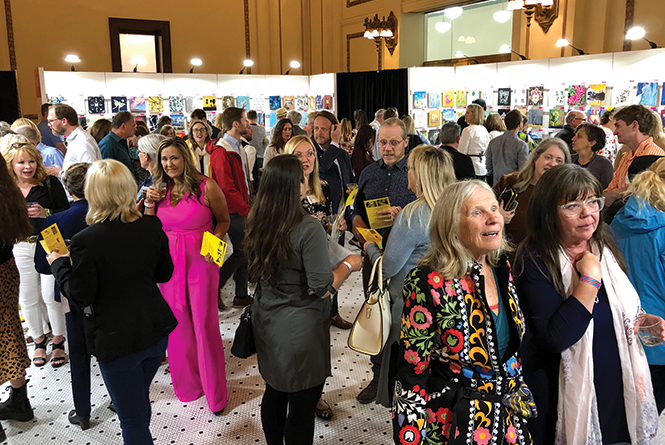
- Shandra Benito
The past month has hit visual and performing arts entities hard, forcing the cancellation of events and a radical re-thinking of finances. For Art Access, it has already led to the hard decision to close its physical gallery permanently—even as the organization's leadership tries to find the positives in re-focusing the organization's mission.
On April 3, Art Access executive director Shandra Benito announced several difficult decisions necessitated by the pandemic for the 35-year old organization dedicated to artistic opportunities for people with disabilities. In addition to shuttering the gallery location and office space on 500 West, all staff positions besides Benito's will be eliminated, with Benito's own position becoming half-time. Many programs will continue, including its artist mentorship program.
While it might be easy to understand the financial impacts on a performing arts organization of lost ticket sales from cancelled events, the impact of COVID-19 on Art Access is more complex, in part a function of the specific timing of social distancing measures. "I kind of expected there to be a potential divergence of funding to funding more emergency-type services," Benito says. "Which I can understand—with people losing houses, and we have a finite amount of money that certain foundations can give. Nobody's going to be coming to a gallery when they're dealing with eviction notices."
Benito also notes that the closures came just before the organization's largest single fundraiser of the year: 300 Plates, an auction event originally scheduled for May which traditionally provides nearly one third of Art Access' annual budget. "When you take into account the sponsorship loss, plus moving to digital rather than in-person, meaning not selling tickets the way we used to, plus alcohol sales at the event, and 70 percent of the art sales, it's about $180,000 every year," Benito says. She adds that there is still a plan to conduct the 300 Plates sales virtually, but now with a 50-50 split between the artists and Art Access. "We felt that right now, artists are really struggling," she adds. "We don't feel comfortable asking for 70 percent."
While the organization itself is not ceasing operations, Benito acknowledges that dealing with these changes has been an emotional process. "Even though Art Access isn't closing, when you're closing the gallery and the office, it feels like that to people," she says. "It's no longer a place to stop by, so it's like losing its home. The gallery was really a place where people got to know us, that we added something to the art scene that was different.
"Obviously, as an executive director, my job is to look at the big picture: How do we continue the mission and the job as Art Access to the people we serve? That's what I came back to over and over. I realize this is going to be a loss that's important to grieve and acknowledge publicly. I've had people reach out and say, 'I've had my first exhibit there. It's an important place to me.'"
That big-picture examination, however, has led Benito to realize the impact that Art Access has had in terms of pioneering programs which have now been picked up elsewhere, allowing the organization to turn to other priorities. She notes, for example, Art Access' work with veterans on art therapy, and how the Utah Cultural Celebration Center in West Valley has launched a Veterans' Art Community Center. "As a non-profit, your job is to respond to community needs, and recognize when that needs to be adjusted," Benito says. "There's more and more focus on diversity and inclusion in the art world. If we close some of these programs that are being done in other places, we can still push the effort forward to make sure every arts organization in Salt Lake City is an inclusive arts organization."
So for now, while there is still some grieving to be done, Benito chooses to focus on what Art Access will still be able to do, including the virtual version of 300 Plates and working on an ongoing basis to advocate for the needs of people with disabilities and other marginalized communities in the local art scene. "I do think this is an opportunity," she says. "There's a quote by W.E.B. DuBois, 'You must always be prepared to give up what you are to be what you will become.' That's always spoken to me. ... We have a lot of knowledge about the fundamentals of disability rights and what it means to really value all people, and the foundation of trust with our community. It's a beautiful opportunity."